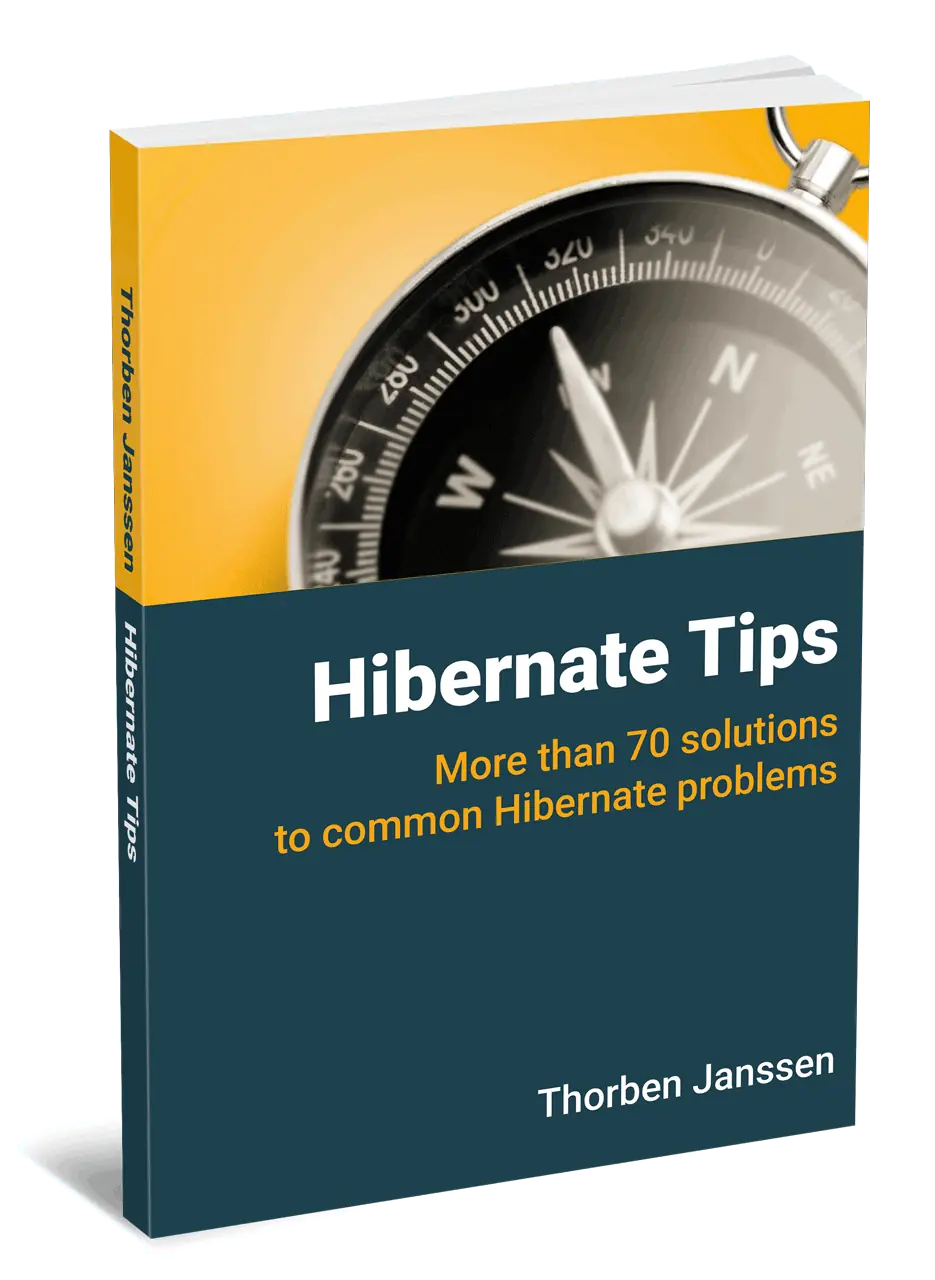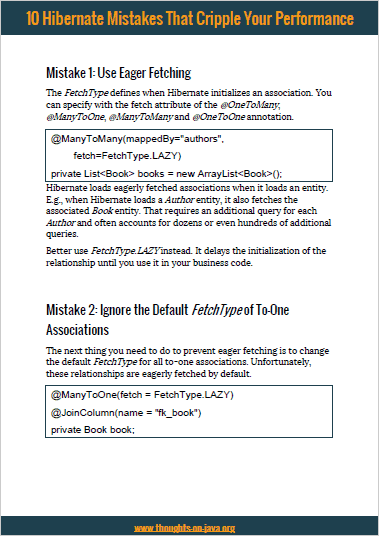Hibernate Tips: What’s the best way to persist a ZonedDateTime
Take your skills to the next level!
The Persistence Hub is the place to be for every Java developer. It gives you access to all my premium video courses, monthly Java Persistence News, monthly coding problems, and regular expert sessions.
Hibernate Tips is a series of posts in which I describe a quick and easy solution for common Hibernate questions. If you have a question for a future Hibernate Tip, please leave a comment below.
Question:
During last week’s Hibernate workshop, I got a few questions about Hibernate’s handling of ZonedDateTime objects. To sum them up, all attendees wanted to know what’s the best way to persist an attribute of type ZonedDateTime with Hibernate.
Solution:
Since version 5, Hibernate supports some classes of the Date and Time API as basic types. The ZonedDateTime class is one of them.
@Entity
public class Review {
private ZonedDateTime postedAt;
...
}
But it’s not supported in the way you might expect. Hibernate doesn’t persist any timezone information for it. It converts the value to the local timezone and stores it as a timestamp. My current timezone is UTC+2. So, if I persist a ZonedDateTime in EST, which is UTC-4, Hibernate converts it to UTC+2 before it writes it to the database.
As I explained previously, this causes problems when:
- You use a time zone with daylight saving time
- Your systems use a different time zones
- You change the timezone of your application for some reason
That’s why you should use the configuration parameter hibernate.jdbc.time_zone, which Hibernate introduced in version 5.2. It enables you to specify the timezone that Hibernate shall use for its conversions. In this example, I set the timezone to UTC.
<?xml version="1.0" encoding="UTF-8" standalone="yes"?> <persistence xmlns="http://xmlns.jcp.org/xml/ns/persistence" xmlns:xsi="http://www.w3.org/2001/XMLSchema-instance" version="2.1" xsi:schemaLocation="http://xmlns.jcp.org/xml/ns/persistence http://xmlns.jcp.org/xml/ns/persistence/persistence_2_1.xsd"> <persistence-unit name="my-persistence-unit"> <description>Hibernate Tips</description> <provider>org.hibernate.jpa.HibernatePersistenceProvider</provider> <exclude-unlisted-classes>false</exclude-unlisted-classes> <properties> <property name="hibernate.dialect" value="org.hibernate.dialect.PostgreSQLDialect" /> <property name="hibernate.jdbc.time_zone" value="UTC"/> <property name="javax.persistence.jdbc.driver" value="org.postgresql.Driver" /> <property name="javax.persistence.jdbc.url" value="jdbc:postgresql://localhost:5432/recipes" /> <property name="javax.persistence.jdbc.user" value="postgres" /> <property name="javax.persistence.jdbc.password" value="postgres" /> </properties> </persistence-unit> </persistence>
If you now persist a new entity, Hibernate tells you in the log messages that it persists the timestamp with the timezone specified by the LocalDate. In this example, that’s UTC-4.
EntityManager em = emf.createEntityManager();
em.getTransaction().begin();
// Persist a new Review using a timezone UTC-4
Review r = new Review();
r.setComment("Amazing Book!");
r.setPostedAt(ZonedDateTime.now(ZoneId.of("UTC-4")));
em.persist(r);
em.getTransaction().commit();
em.close();
06:30:59,636 DEBUG [org.hibernate.SQL] - select nextval ('hibernate_sequence')
06:30:59,638 DEBUG [org.hibernate.SQL] - insert into Review (fk_book, comment, postedAt, id) values (?, ?, ?, ?)
06:30:59,638 TRACE [org.hibernate.type.descriptor.sql.BasicBinder] - binding parameter [1] as [BIGINT] - [null]
06:30:59,638 TRACE [org.hibernate.type.descriptor.sql.BasicBinder] - binding parameter [2] as [VARCHAR] - [Amazing Book!]
06:30:59,639 TRACE [org.hibernate.type.descriptor.sql.BasicBinder] - binding parameter [3] as [TIMESTAMP] - [2018-05-01T00:30:59.634-04:00[UTC-04:00]]
06:30:59,640 TRACE [org.hibernate.type.descriptor.sql.BasicBinder] - binding parameter [4] as [BIGINT] - [2]
But when you take a look at the database record, you can see that it converted it to UTC.
Learn more:
If you’re using the Date and Time API, you might also be interested in these articles:
- Hibernate 5: How to persist LocalDateTime & Co with Hibernate
- How to persist LocalDate and LocalDateTime with JPA 2.1
- How To Map The Date And Time API with JPA 2.2
- Hibernate Tips: How to map a java.util.Date to a database column
Hibernate Tips Book

Get more recipes like this one in my new book Hibernate Tips: More than 70 solutions to common Hibernate problems.
It gives you more than 70 ready-to-use recipes for topics like basic and advanced mappings, logging, Java 8 support, caching, and statically and dynamically defined queries.


